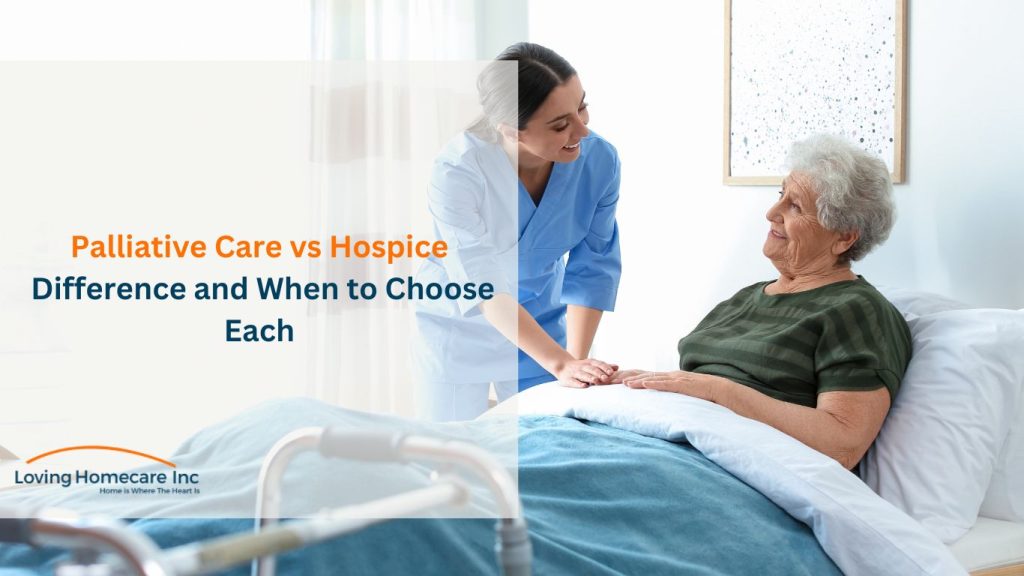Recently updated on October 1st, 2025 at 12:31 pm
Two terms frequently arise when navigating end-of-life care options: palliative care vs hospice. While they share similarities, they serve distinct purposes and cater to different needs.
Understanding the differences between palliative and hospice care is crucial for making informed decisions regarding healthcare options, especially for seniors.
This comprehensive guide explores the nuances of both types of care, their benefits, and when each might be the most appropriate choice.
What is Palliative Care?

Palliative care is a holistic approach to healthcare that focuses on improving the quality of life for individuals facing advanced illness or other serious illness management needs.
Unlike hospice care, palliative care and curative treatments can be provided at any stage of illness.
Benefits of Palliative Care:
- Symptom Management: Palliative care focuses on alleviating pain, managing symptoms, and providing comfort care, leading to improved overall well-being.
- Enhanced Communication: It facilitates open and honest discussions between patients, families, and healthcare providers about treatment goals, preferences, and end-of-life wishes.
- Coordination of Care: The interdisciplinary care team collaborates with other healthcare professionals to ensure seamless transitions between different levels of care and support services.
- Emotional and Spiritual Support: Patients and families receive counselling, emotional support, and assistance in coping with the challenges associated with serious illness.
When to Choose Palliative Care:
- Hospice vs palliative care for seniors often raises questions, but palliative care is appropriate for individuals of any age and at any stage of a serious illness.
- It is particularly beneficial for seniors facing complex health issues, as it addresses physical, emotional, and social needs.
- Palliative care for seniors and individuals of any age is appropriate across all stages of palliative care, whether alongside curative treatments or during the transition to end-of-life care.
What is Hospice Care?

What is Hospice care is a frequently asked question. Hospice care is a specialized form of healthcare designed for individuals with a terminal illness whose life expectancy is six months or less, as certified by a physician.
Unlike palliative care, hospice care focuses primarily on comfort care and support rather than pursuing curative treatment.
Benefits of Hospice Care:
The benefits of Hospice care are here below:
- Comfort and Dignity: Hospice care focuses on enhancing the quality of life by managing symptoms, promoting comfort, and preserving dignity.
- Emotional Support: Hospice teams provide emotional and spiritual support during the complexities of grief and loss.
- 24/7 Access to Care: Hospice services are available around the clock, so patients receive symptom management whenever needed.
- Family Involvement: Hospice encourages family involvement in caregiving decisions, ensuring patients’ preferences are respected and honored.
Loving Homecare Inc. provides non-medical in-home support for seniors across Los Angeles, San Gabriel Valley, and Orange County.
Contact us today to get the benefit from our services.
When to Choose Hospice Care:
- Hospice care is appropriate for individuals with a terminal illness whose life expectancy is six months or less, as determined by a physician.
- This is often when to choose hospice over palliative care — when curative treatment is no longer effective or desired, and the focus shifts to maximizing comfort care and quality of life.
- Hospice care is particularly beneficial for seniors in the advanced stages of illness who wish to spend their remaining time in a supportive environment with trusted end of life care services and the presence of loved ones.
Palliative Care vs. Hospice Care: Key Differences
Another frequently asked question is the difference between palliative and hospice care.
There are several important distinctions:
Timing of Initiation
- Palliative care: Appropriate at any stage of a serious illness, including periods when curative treatments are in progress.
- Hospice care: Reserved for situations where curative treatments are no longer effective and life expectancy is six months or less.
Treatment Goals
- Palliative care: Oriented toward symptom relief, comfort, and ongoing support for patients and families.
- Hospice care: Centered on comfort and dignity during the final phase of life, without aggressive medical interventions.
Setting of Care
- Palliative care: Delivered in hospitals, clinics, and home settings.
- Hospice care: Most often provided in the home environment, but also available in hospice facilities and inpatient units.
Curative Treatments
- Palliative care: Compatible with treatments intended to cure or slow disease progression.
- Hospice care: Exclusively focused on comfort measures and quality of life, without curative treatments.
How Loving Homecare Inc. Supports Families?
What to Expect: The First Steps
From the moment you contact Loving Homecare Inc., you’ll be guided by a team that values compassion, respect, and transparency. During the first steps, you can expect:
- A caring conversation with our team to understand your family’s situation.
- A customized plan that blends non-medical in-home care with existing medical support.
- Introduction to a dedicated caregiver who is trained in hospice caregiver duties at home, compassionate, and aligned with your loved one’s needs.
- Ongoing communication and updates, ensuring that your family feels supported every step of the way.
How Non-Medical In-Home Care Complements Palliative and Hospice Care
Palliative and hospice care focus on medical needs and comfort. Families, however, often need extra non-medical support to keep their loved ones safe and cared for at home. Loving Homecare Inc. provides that support.
Our non-medical support for palliative care and hospice care works alongside medical teams to create a more complete support system for seniors and their families.
Key ways our services complement palliative and hospice care include:
- Companion care during end-of-life: Offering emotional support, conversation, and a comforting presence
- Personal Care Assistance: Providing assistance with daily living for palliative patients, including bathing, grooming, mobility, and dressing, ensuring clients maintain comfort and dignity.
- Meal Preparation & Light Housekeeping: Creating a safe, clean, and nourishing home environment that supports overall well-being.
- Respite for Family Caregivers: Providing a trusted in-home caregiver for hospice patients so families can rest and recharge, knowing their loved one is in caring hands.
Our caregivers bring compassion, dignity, and personalized attention to every home we serve.
Schedule your free consultation today.
In-Home Palliative and Hospice Support in Los Angeles and Surrounding Areas
At Loving Homecare Inc., we are proud to serve families across Los Angeles, the San Gabriel Valley, and Orange County with trusted non-medical senior care. For over [X] years, our mission has been to help seniors live with dignity, comfort, and independence in the place they call home.
Our team of experienced and compassionate caregivers provides trusted palliative home care services along with daily support that complements hospice care, including personal care assistance, companionship, meal preparation, light housekeeping, and respite for family caregivers.
Families choose Loving Homecare Inc. not only because of our dedication to quality care, but also because of our deep commitment to the local communities we serve.
Conclusion:
In summary, understanding palliative and hospice care is invaluable for individuals facing advanced illness or end-of-life care needs. Understanding the differences between these two forms of care empowers patients and families to make informed decisions that align with their values, preferences, and goals for seniors care.
Whether your loved one is receiving palliative care or transitioning to hospice, Loving Homecare Inc. is here to provide non-medical in-home care that enhances comfort and preserves dignity. Proudly serving Los Angeles, San Gabriel Valley, and Orange County.
Contact Loving Homecare now to discuss your family’s care needs and discover how we can help.
FAQs
Q1: Can palliative and hospice care be provided at home?
Yes, both can be provided in the comfort of a patient’s home. Families often choose home care for its familiarity and comfort, and Loving Homecare Inc. works alongside medical providers to ensure seniors receive both clinical and non-medical support.
Q2: What is the main difference between palliative and hospice?
The main difference is that palliative care can begin at any stage of a serious illness and may include curative treatment, while hospice care is designed for individuals with a life expectancy of six months or less and focuses entirely on comfort care.
Q3: Who is eligible for hospice care?
A physician must certify that a patient’s life expectancy is six months or less if the illness follows its expected course. Hospice is intended for patients who choose to focus on quality of life rather than aggressive medical treatment.
Q4: How does palliative care benefit seniors with chronic illness?
Palliative care helps seniors manage symptoms such as pain, fatigue, and stress from ongoing health issues. It also improves overall quality of life by providing emotional, social, and spiritual support alongside medical treatments.
Q5: What happens if a patient’s condition improves during hospice?
If a patient’s condition stabilizes or improves, they may be discharged from hospice care and return to curative or palliative treatments. Hospice can be resumed later if the need arises.
Q6: How long can you receive palliative care?
There is no set time limit for palliative care. It can continue for months or even years, depending on the patient’s condition and goals for care.
Q7: Are palliative and hospice care covered by insurance?
Yes, hospice care is typically covered by Medicare, Medicaid, and most private insurance plans. Coverage for palliative care can vary, but many services are included under standard health insurance depending on the provider.

